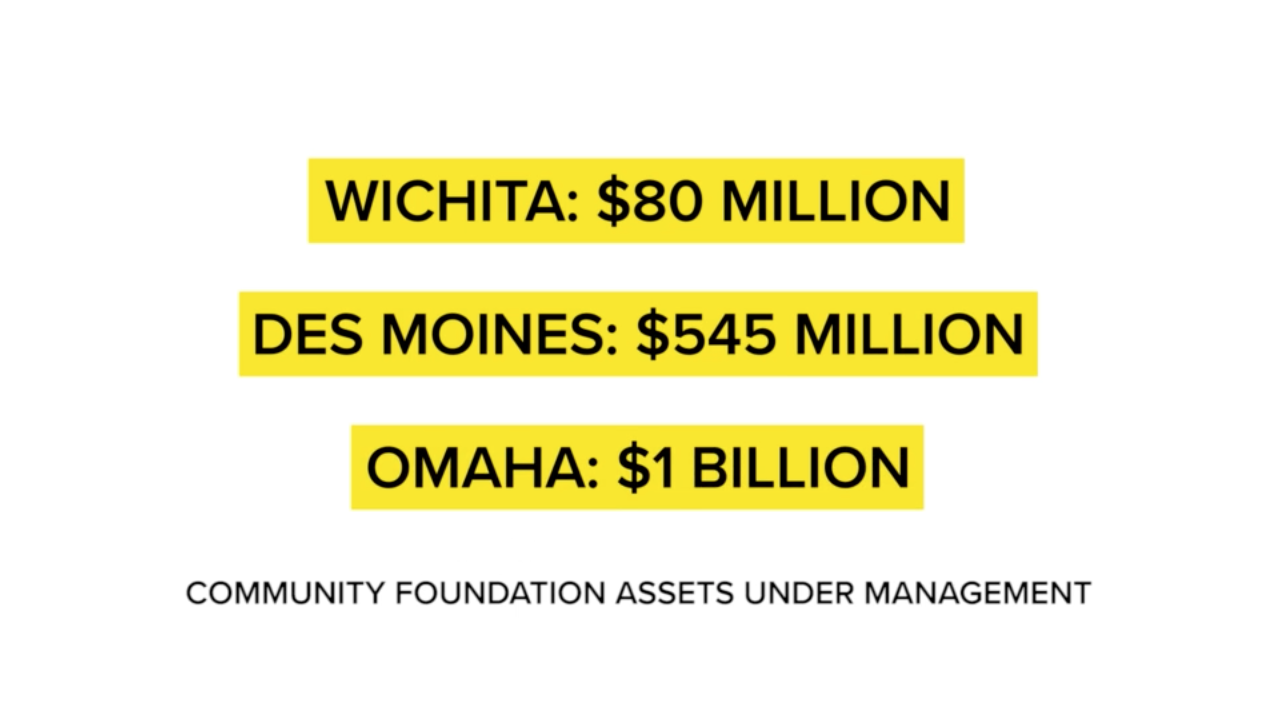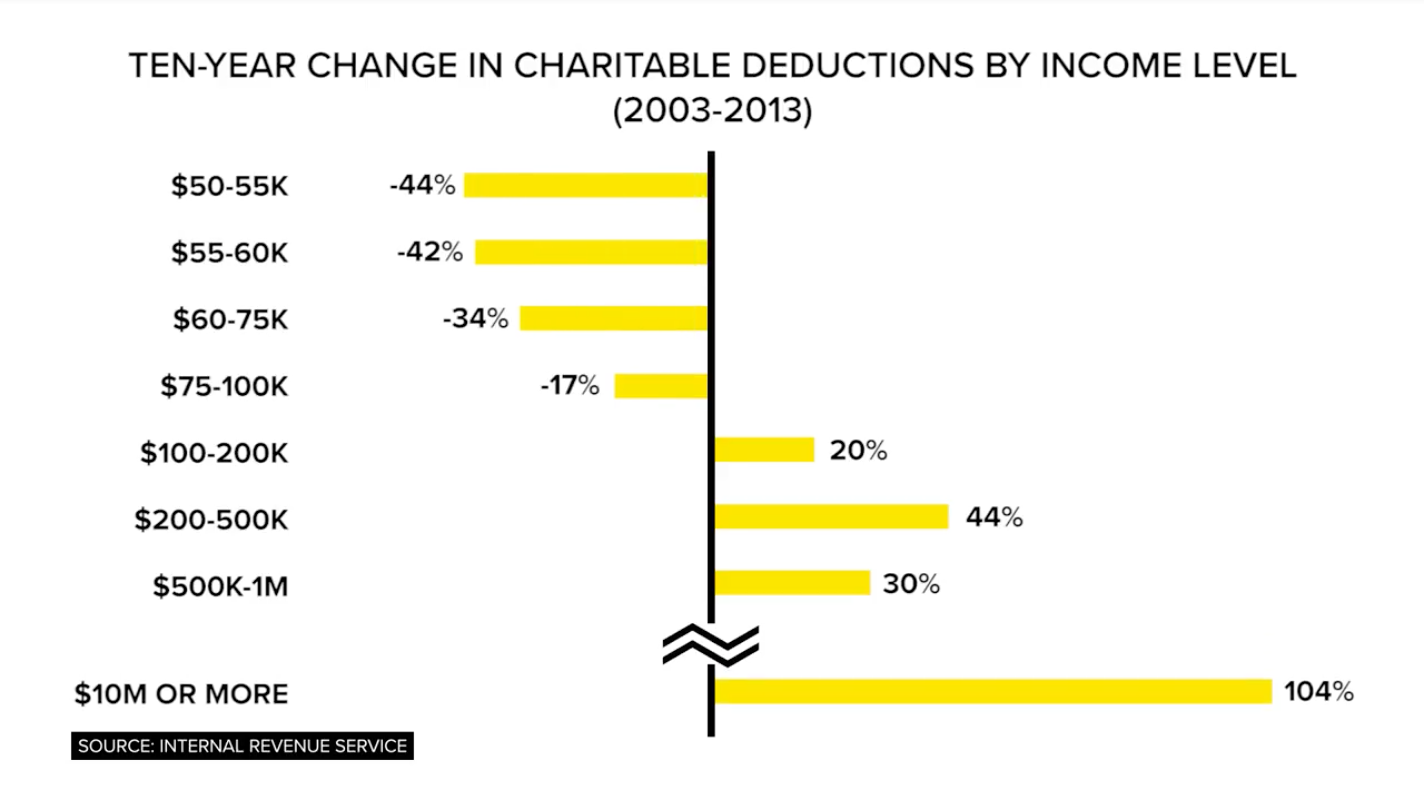The heart of Wichita is in question, with evidence pointing toward Wichitans being less giving than comparable cities, underfunding the public and private sectors, along with nonprofits.
Watch this short video to learn more about the state of giving in Wichita, and why it's so important we learn how to give back to our community members in need.
WHY GIVING MATTERS
Motives for giving vary from individual to individual. Some prioritize tax incentives while others see their contributions as the fulfillment of religous obligation. Ultimately, giving is most impactful when it comes from the heart. Such altruism is a benefit to our community and the people who live there.
The biggest benefit happens when giving comes from a deeper need within the individual — a need to help others and to create a stronger community in which we all help each other. Giving leads to more giving, which leads to more needs being met throughout the community.

"For somebody to take on a project that's about something bigger than themselves, ... it can be an incredibly rewarding experience for them," says Robert Swanson, president and CEO of Swanson House, a consulting firm that helps nonprofit organizations raise funding. "For our clients in the nonprofit universe, spending time with those individuals and helping them understand how they can change the culture of a community, or address a specific issue that needs to be addressed, can be incredibly rewarding for the individual person."
Wichita has nearly 2,000 registered nonprofits — and perhaps even more that aren't registered. That comes out to about one nonprofit for every 195 Wichitans, and they all need funding.
So how are we meeting the needs of our nonprofit organizations to ensure they can meet the needs of the community?
BUILDING A FOUNDATION OF GIVING
It would be impossible to gauge the amount of funds given to every charity, church and organization in Wichita. A good representative organization might be the Wichita Community Foundation.

"We really want to act as conveners of the community to bring people together to talk about issues that are going on in Wichita and then to try to find solutions," says Shelly Prichard, president and CEO of the Wichita Community Foundation (WCF). "We have a lot of interaction with community groups and individuals, trying to bring people with the money together with the people with the ideas."
The WCF doesn't do much in the way of traditional fundraising. Instead, they work with individuals who want help managing their giving. The foundation currently has about 300 funds making up about $8 million in total assets under management.
Fees on those funds pay for the WCF's operational costs, while the foundation directs money toward causes their donors want to support, as well as community-wide initiatives. One of those initiatives was Focus Forward, which brought Reach Advisors data analyst James Chung to Wichita.
EDITOR'S NOTE James Chung's research inspired the work we do here at The Chung Report. While he has graciously allowed us to use his name, he is not directly involved with our content.
"We've grown significantly over the last six years and hope that trend continues, and we see a lot of our external-facing work is helping us attract other donors," Prichard says. "We were very traditional — a transactional model. People put money here, we paid it out to who they told us to, and we've really shifted that over the last five years."
Now, more donors are interested in giving unrestricted donations to the Wichita Community Foundation, allowing them to continue their own work with initiatives like Focus Forward and in literacy and nonprofit development.
Despite significant growth in recent years, the Wichita Community Foundation still manages far fewer funds than community foundations in peer cities like Omaha and Des Moines.

"Obviously, statistics look at the overall trend, and then there are individual cases within those statistics that absolutely disprove it," Prichard says. "We have some amazingly generous people in our town — we work with a lot of them — so I'm uncomfortable saying, in a broad, general scope, that Wichitans aren't generous."
That being said, statistics do show a general underinvestment in business, the private sector and in the Wichita Community Foundation.
"I think conservatism of our state may play a part of that — that we're a little more cautious in how we spend our money, including how we donate our money," Prichard says. "I wish I had the answer [to our underinvestment problem] because then we would work on it and fix it. I don't have great answers for that one, unfortunately."
FUNDING NONPROFITS
Across the entire country, generosity has shifted. Between 2003 and 2013, the wealthiest of Americans have increased their giving. But at the same time, the rest of the country has actually decreased giving.

This imbalance in giving has led some nonprofits to change their funding strategies, focusing more effort on cultivating endowment-based giving.
"Endowment is the concept of raising charitable dollars, sequestering it, investing it, and then having an annual distribution from that endowment to help subsidize, or to support, the annual fund program," Swanson says. "And organizations that have endowments are financially more stable than those that don't have that resource at their disposal."
Throughout the years, Swanson House, based in Emporia, has helped about 20 Wichita nonprofits with their fundraising endeavors. One of those is Envision, which helps improve the lives of visually impaired people in the region and is in its third fundraising campaign with Swanson House.
Swanson is quick to point out that it's not just local dollars that help support organizations like Envision.
"One of the great things that donors learn in the course of all of this is that if they're willing to step up to the plate and do something significant for their local nonprofits, it helps position those nonprofits to open the door to other funders in other places," he says. "What those out-of-county and out-of-state funders are looking for, in part, is a threshold of local support from local donors in this process."
That means that if the Wichita community shows support for specific causes, it could allow those causes and organizations to seek support from other communities.
This makes it that much more important to show your support for the causes in which you believe. But first, you have to find those causes.
HOW TO GIVE BACK
So what do you want to see in your community? Improved resources and shelter for the homeless? More activities that bring Wichita's various communities and neighborhoods together? An end to human trafficking?
Wichita has countless choices of nonprofits, and finding one that fits your passion can be daunting.
"What do you worry about? What concerns you? What do you enjoy doing? I would encourage people to think about the things in our community that they take part in and then try giving a gift," Prichard says. "The joy of giving can be profound when somebody realizes how important that can be on their life."
The Wichita Community Foundation could be a great place to start if you have funds you want to donate but need help managing. Another place to start could be the Nonprofit Chamber of Service.
If you have an organization in mind, you can use websites like give.org, givewell.org and charities.org to see how well they are doing to ensure funds go to the cause they claim they go to.
You can get plugged in through the local United Way of the Plains by visiting their website or simply calling 2-1-1.
"There are tools," Prichard says. "I know it's often hard to make that first step, but between the organizations, between us, the United Way, 2-1-1 and other organizations in town, we can help make that introduction so it's not a cold call."
It's on all of us to get plugged in, and to start giving so we can together move this community forward.